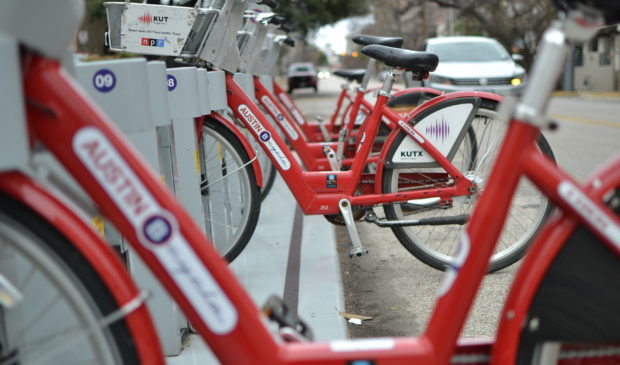Newsletter Signup
The Austin Monitor thanks its sponsors. Become one.
Most Popular Stories
- Parks Board recommends vendor for Zilker Café, while voicing concerns about lack of local presence
- City leaders evaluate surprising ideas for water conservation
- Audit: Economic official granted arts, music funding against city code
- Downtown Historic Resource Survey eyes seven new districts eligible for designation
- Austin is losing even more water to leaky city pipes than previously thought
-
Discover News By District
Popular Whispers
Sorry. No data so far.

B-cycle prepares for shift in leadership
Tuesday, May 21, 2019 by Ryan Thornton
In the wake of steady ridership losses and multiplying competitors, Elliott McFadden, executive director of the public bike-share system Austin B-cycle, has decided to step away from the bike rental program.
McFadden notified B-cycle’s board of directors in mid-April that he would be leaving his position at the end of May. McFadden has served as B-cycle executive director since 2013.
In a brief interview, McFadden told the Austin Monitor that an “orderly transition” of management is underway at B-cycle, rejecting the notion that his departure will slow the organization down. Rather, he said, the board will continue pushing innovative projects like the new bike-share program launched at the Domain early this year.
McFadden declined to explain the reasons for his decision, claiming the choice was personal. It’s no secret, however, that the dawn of dockless mobility has had a few detrimental effects on the relatively young bike-share system.
Since its launch in late 2013, the program has broken a national record for bike check-outs and grown its network of stations from 11 to 76. During that time, McFadden said, the organization has endeavored to stay on its toes with potential improvements (like last year’s e-bike pilot program that temporarily tripled the system ridership).
That progress, however, took a downward turn when dockless scooters appeared in Austin early last summer. McFadden said the sharp cut in total ridership is entirely due to the roughly 15,000 scooters now on the ground.
Unfortunately, he said, the scooters had consequences on the B-cycle system other than just taking a fair share of customers. In particular, the lack of defined parking for scooters blocked access to the bike-share stations and created complications for riders.
McFadden said B-cycle had asked the city to implement more aggressive regulations that would specifically prohibit leaving scooters at or near the bike stations. But at the time, the city was not prepared to take that step.
“Stations create order and dependability,” McFadden said, arguing for equally orderly designated parking areas for scooters in high-volume areas. On the other hand, he said, the downside to dockless is chaos.
McFadden doesn’t think the dockless system is all bad, though. In an example of doing things more sustainably, he cited the dockless electric sit-down scooter company Ojo, which has deployed relatively few scooters as it prepares for a bigger launch this summer.
Ojo also entered into a partnership with nonprofit Bike Share of Austin (also in charge of B-cycle’s operations) when it entered the market, sharing a portion of its profits for the benefit of local management services.
As for its impact on bike-share ridership, McFadden said “Ojo is a blip” compared to the impact of the major scooter operators.
The dockless wave has also opened city transportation officials’ eyes to their failure to complete Austin’s bicycle network, said McFadden, who sat on the Bike Austin board prior to his work at B-cycle. The city has had a bicycle plan for a long time, he said, and much of the conflict surrounding scooters is driven by the city’s failure to implement that plan.
Citing the Austin Transportation Department’s proposal to move dockless operators to a franchise model in order to generate funds for that missing infrastructure, McFadden said, “If the chaos of scooters means we actually get the all-ages and -abilities network” outlined in the Bicycle Master Plan, “it would all be worth it.”
Photo by Caleb Pritchard.
The Austin Monitor’s work is made possible by donations from the community. Though our reporting covers donors from time to time, we are careful to keep business and editorial efforts separate while maintaining transparency. A complete list of donors is available here, and our code of ethics is explained here.
You're a community leader
And we’re honored you look to us for serious, in-depth news. You know a strong community needs local and dedicated watchdog reporting. We’re here for you and that won’t change. Now will you take the powerful next step and support our nonprofit news organization?


